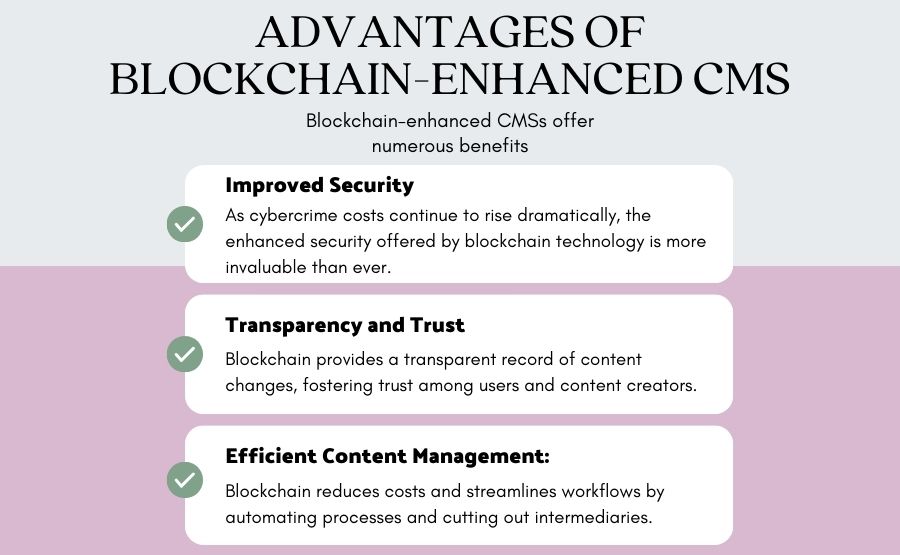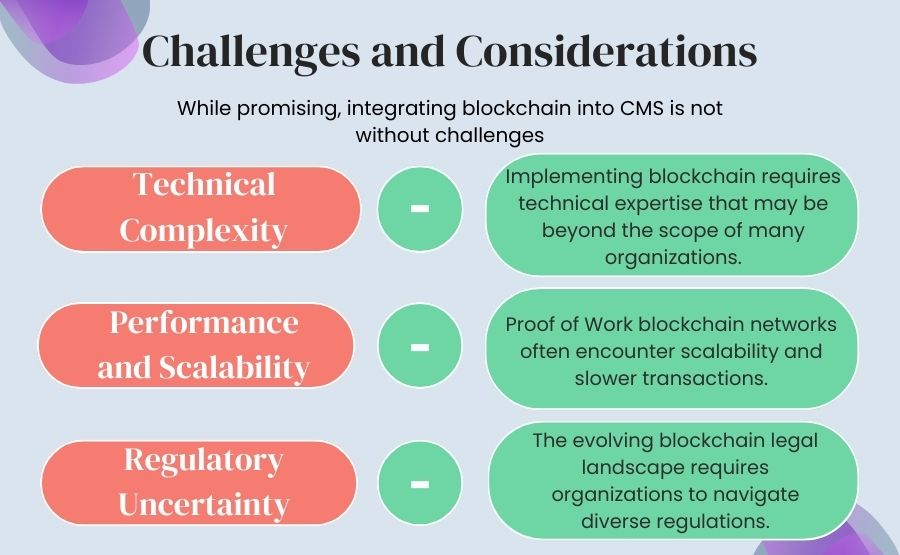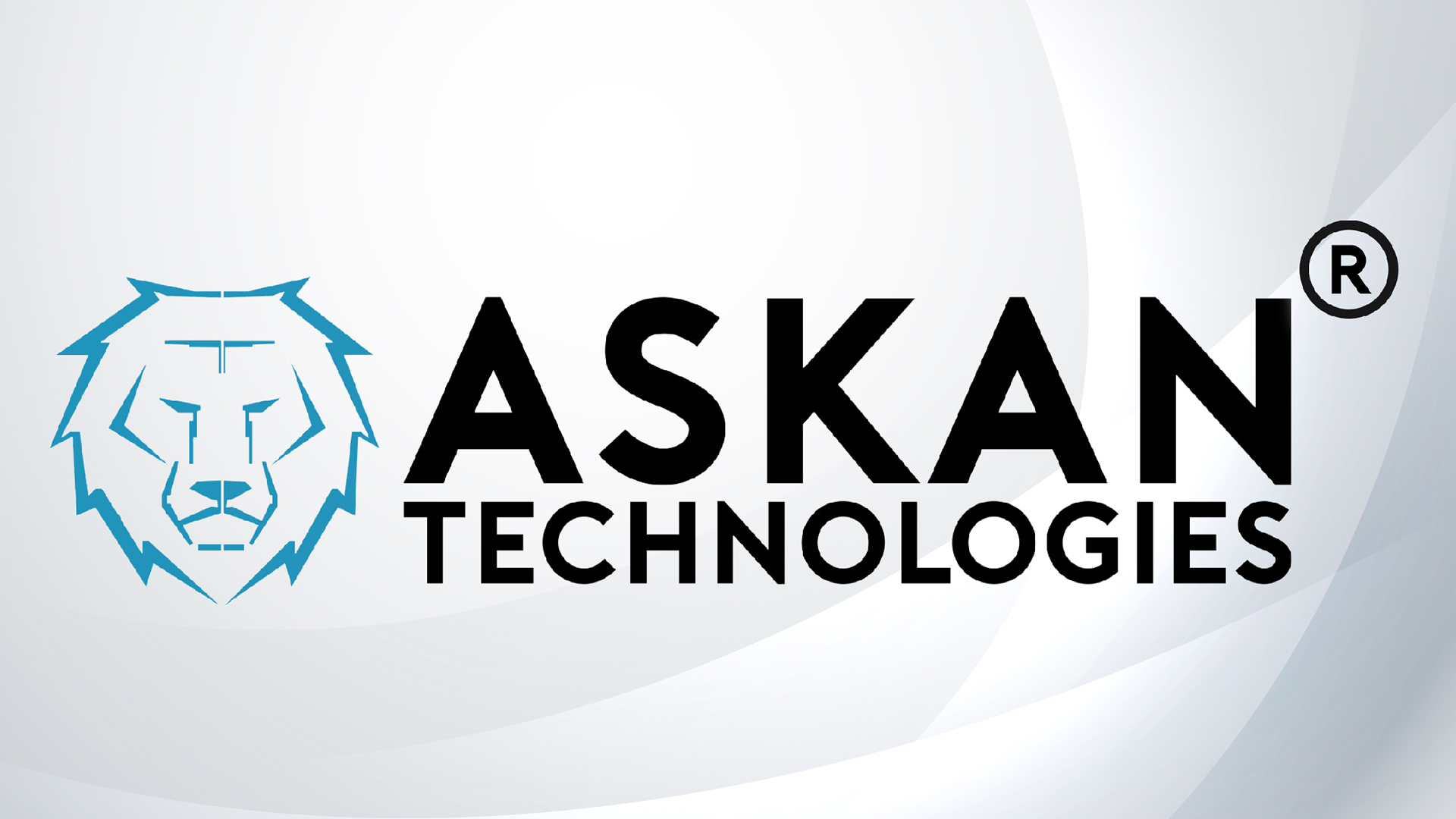Welcome to a world where the innovative power of blockchain technology meets Content Management Systems (CMS), setting the stage for unprecedented security, efficiency, and trust.
Blockchain isn't just reshaping finance and healthcare; it's now revolutionizing the way we handle digital content. But what does this mean for the future of content management?
With an estimated 30% of global organizations expected to use blockchain services by 2024, this article breaks down the essential concepts of blockchain in CMS and explores how it's poised to transform the way we create, manage, and share content. Are you ready to be part of this change?
- Understanding Blockchain Technology
- Overview of Content Management Systems (CMS)
- The Intersection of Blockchain and CMS
- Core Concepts of Blockchain in CMS
- Advantages of Blockchain-Enhanced CMS
- Challenges and Considerations
- Future of Blockchain in CMS
Understanding Blockchain Technology
Blockchain is a distributed ledger technology celebrated for its decentralization, transparency, security, and immutability.
Essentially, it's a series of data blocks securely linked together, forming a chain. While it's the backbone of cryptocurrencies like Bitcoin, blockchain's potential extends much further.
It's revolutionizing sectors from supply chain management to digital identity verification.
As of 2023, it's reported that nearly 40% of companies worldwide are either already using or rapidly adopting blockchain technology, underscoring its expanding influence and the growing recognition of its transformative power.
Overview of Content Management Systems (CMS)

A Content Management System (CMS) is a software application used to manage the creation and modification of digital content.
CMSs are crucial in today's digital landscape, powering websites, blogs, and e-commerce platforms. Despite their utility, traditional CMSs face challenges like data breaches.
For instance, in a notable 2020 incident, the popular software company Adobe experienced a significant web-based attack, compromising millions of user accounts. Reports indicate that web-based attacks increased by 56% in 2020 alone.
This vulnerability underscores the need for a more secure solution, highlighting the importance of integrating robust security measures like blockchain technology into CMS platforms.
The Intersection of Blockchain and CMS
Integrating blockchain with CMS can significantly enhance the latter's capabilities. For instance, WordPress, powering 39.5% of all websites, could benefit from blockchain's secure environment to mitigate frequent security concerns.
Blockchain can ensure data integrity, protect against unauthorized access, and provide a transparent content history.
Additionally, by enabling immutable records of content revisions and ownership, blockchain can greatly enhance trust and accountability in content management systems, making it easier to track and verify the legitimacy of information.
Core Concepts of Blockchain in CMS
Decentralized Content Storage:
Blockchain can distribute and store content across multiple nodes, ensuring no single point of failure.
IPFS, a peer-to-peer hypermedia protocol, is an example where blockchain can make CMS content more resilient and tamper-proof.
Smart Contracts for Content Management:
These are self-executing contracts with the terms directly written into code. They can automate various aspects of CMS, like rights management and content monetization.
Ethereum, with its robust smart contract capabilities, is already being used to automate and secure transactions.
Enhanced Security and Data Integrity:
Blockchain's immutable nature means once data is entered, it cannot be altered, providing a secure audit trail.
This feature is crucial for CMSs handling sensitive information, ensuring content remains unaltered and traceable.
Advantages of Blockchain-Enhanced CMS

Blockchain-enhanced CMSs offer numerous benefits:
Improved Security: As cybercrime costs continue to rise dramatically, the enhanced security offered by blockchain technology is more invaluable than ever.
In 2023, with digital threats constantly evolving, blockchain's role in reducing the risk of data breaches and unauthorized access becomes increasingly critical.
Recent studies indicate that incorporating blockchain can reduce cybercrime incidents by up to 30%, showcasing its effectiveness in fortifying digital defenses.
Transparency and Trust: Blockchain provides a transparent record of content changes, fostering trust among users and content creators.
This transparency is particularly beneficial for news and media platforms, where the authenticity of information is crucial.
For instance, the New York Times has experimented with blockchain to combat misinformation and maintain the integrity of digital news.
By recording a verifiable history of news stories, blockchain can help ensure that the content viewed by the public remains unaltered and trustworthy.
Efficient Content Management: By automating processes and reducing the need for intermediaries, blockchain can lower operational costs and streamline content management workflows.
This efficiency is particularly transformative for industries like publishing, where managing rights and royalties can be complex and time-consuming.
For example, publishing giant Penguin Random House has explored blockchain to simplify and expedite royalty distribution, ensuring authors receive their earnings more quickly and transparently.
Challenges and Considerations

While promising, integrating blockchain into CMS is not without challenges:
Technical Complexity: Implementing blockchain requires technical expertise that may be beyond the scope of many organizations.
This often necessitates partnering with specialized blockchain developers or investing in extensive training for existing staff, which can be a significant hurdle for smaller companies or those with limited technical resources.
Performance and Scalability: Blockchain networks, especially those using Proof of Work, can face scalability issues and slower transaction speeds.
As the network grows and the number of transactions increases, these challenges can become more pronounced, potentially impacting the user experience and overall efficiency of the system.
Regulatory Uncertainty: The legal landscape for blockchain is still evolving, and organizations must navigate varying regulations across jurisdictions.
This can lead to a complex compliance environment, where businesses operating internationally might have to adhere to multiple, sometimes conflicting, regulatory standards, adding to the challenge and risk of adopting blockchain technology.
Future of Blockchain in CMS
The future of blockchain in CMS is bright, with emerging trends like decentralized autonomous organizations (DAOs) and tokenization of assets.
As technology matures, we can expect more CMS platforms to adopt blockchain, offering more secure, efficient, and transparent content management solutions.
For instance, WordPress has seen plugins like 'WordProof' emerge, which leverages blockchain to timestamp content, helping to verify its authenticity and protect the intellectual property of creators.
The integration of blockchain into CMS represents a significant leap forward in how we manage and trust digital content.
While challenges remain, the potential benefits of enhanced security, efficiency, and transparency are too compelling to ignore.
As we move forward, it's clear that blockchain will play an increasingly vital role in the evolution of content management systems.











The Core Concept of Blockchain Development in CMS
Welcome to a world where the innovative power of blockchain technology meets Content Management Systems...
Share this link via
Or copy link